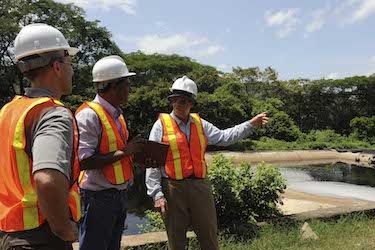 Environmental engineering is the unspoken science that’s concerned with protecting people from adverse environmental effects and minimizing the impact of human development on the environment around us. Environmental engineers also evaluate environmental hazards or toxins, then oversee their removal through engineering technology. Graduates of online environmental engineering degree programs may work inside waste treatment plants or pollution control agencies. They may work for private industry designing pollution control systems. They may also work for the federal or state government testing for toxins and engineering site clean-ups. If you’re passionate about protecting the natural environment and public health, and you have the motivation to study a variety of math and sciences in order to bring them together for the common good, then you may find that environmental engineering can offer a fulfilling path of upward mobility in a career that is dedicated to the type of problem-solving that can make a lasting impact on the world around you.
Environmental engineering is the unspoken science that’s concerned with protecting people from adverse environmental effects and minimizing the impact of human development on the environment around us. Environmental engineers also evaluate environmental hazards or toxins, then oversee their removal through engineering technology. Graduates of online environmental engineering degree programs may work inside waste treatment plants or pollution control agencies. They may work for private industry designing pollution control systems. They may also work for the federal or state government testing for toxins and engineering site clean-ups. If you’re passionate about protecting the natural environment and public health, and you have the motivation to study a variety of math and sciences in order to bring them together for the common good, then you may find that environmental engineering can offer a fulfilling path of upward mobility in a career that is dedicated to the type of problem-solving that can make a lasting impact on the world around you.
THE CAREER PATH
While demand is high, this is one of the lower paying engineering disciplines according to Pay Scale. Graduates with bachelor degrees can expect earnings of $41,611 to $90,455. Those employed in private industry and consulting will earn more than government employees. The path of environmental engineering combines the principles of engineering, soil science, biology, and chemistry to develop solutions to environmental problems, according to the Department of Labor (DOL). In general, these professionals research, design, plan, and perform engineering duties in the prevention, control, and remediation of environmental hazards using various engineering disciplines.
Environmental engineers may work to improve various areas, such as recycling, waste disposal, public health, water, and air pollution control. They may also choose to focus their career on addressing global issues, including unsafe drinking water, climate change, or environmental sustainability. The types of tasks that environmental engineers will typically perform on duty look like:
- advising corporations and government agencies of procedures to follow to protect people and the environment
- collaborating with environmental scientists, planners, hazardous waste technicians, engineers, experts in law and business, and other specialist to address environmental issues
- designing projects that lead to environmental protection
- analyzing scientific data and performing quality control checks
A career in environmental engineering can begin with an associate’s degree, as an environmental engineering technician, making an average of almost $50,000 on average. With a bachelor’s degree, professionals can pursue a career as an environmental engineer, making more than $80,000 each year. The time is ripe for aspiring environmental engineering professionals, since the demand for technicians is expected to grow substantially in the coming decade, and the demand for engineers is on par with the national average.
WHO IS THE IDEAL CANDIDATE?
Careers in environmental engineering require a unique understanding of many different engineering principles and additional sciences and the ways in which they work together. Successful environmental engineers are big-picture thinkers, with the motivation to study and learn a variety of subjects.
In addition to excelling at math and science, environmental engineers must have the communication skills to work with various teams on different projects. They must be observational and innovative, in order to come up with solutions to complex problems. If you are passionate about creating a more sustainable and healthy society, then you should consider what it would take to start your career in environmental engineering.
WHAT SHOULD I LOOK FOR?
Expect an environmental engineering degree online to offer courses in environmental engineering, environmental regulatory law, waste management, hydraulics, microbiology, ground water flow, advanced chemistry and industrial contaminants. Because an environmental engineering major requires access to laboratories and may require the handling of hazardous materials, most online degrees in this discipline are master’s degrees. Engineering programs in this major assume students are actively employed in agencies that can support lab projects and toxin analysis. Some online master of science in environmental engineering degree programs will accept students who hold bachelor’s degrees in the life sciences, such as chemistry. Others will only accept students who hold formal bachelor of science in engineering (BSE) degrees. Graduate online certificates are also popular. Online certificates can help working environmental engineers, who must travel often to undertake testing and reclamation projects, meet continuing education requirements.
The best programs will be programmatically recognized by the Accrediting Board for Engineering and Technology (ABET), and may offer opportunities to gain experience in conjunction with coursework. Entry-level positions for environmental engineers don’t require a license, but competitive professionals can seek a Professional Engineer (PE) certification from their state if they hope to advance to leadership opportunities. Environmental engineers with their PE certification are also eligible to earn their board certification from the American Academy of Environmental Engineers and Scientists.
COST
An online master’s level engineering degree costs $28,000, on average, in the United States. This number doesn’t include the additional costs of textbooks, technology equipment, and licensing or certification fees. It’s important to consider the options that are going to be flexible with your schedule and needs as well as that offer a quality education that is budget-friendly.
